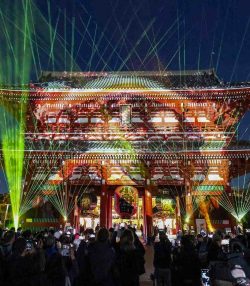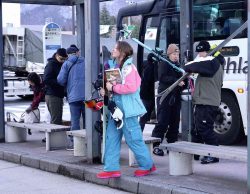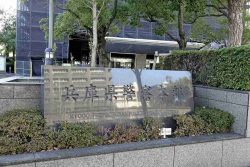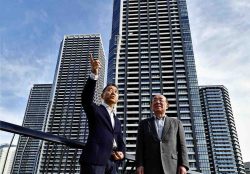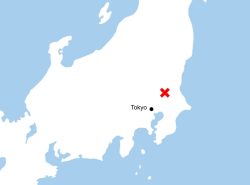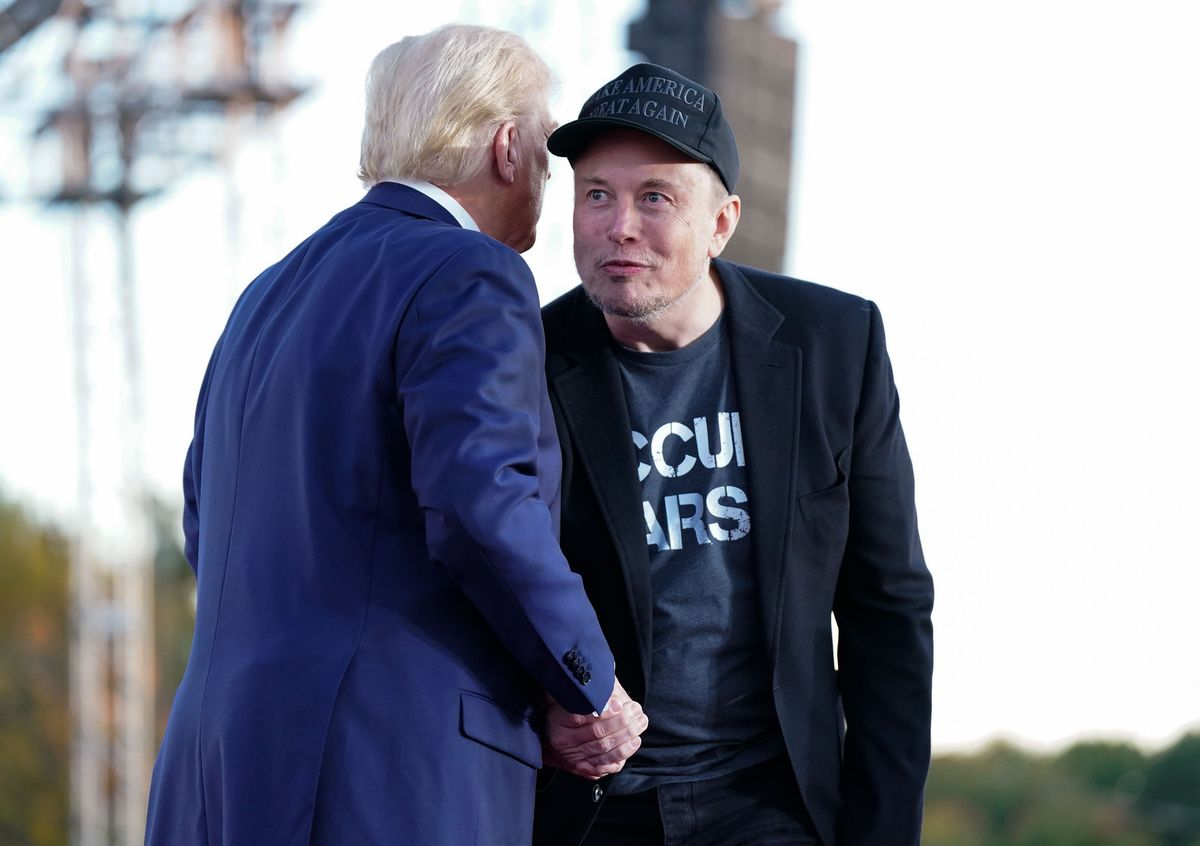
Tesla and SpaceX CEO Elon Musk speaks with former president Donald Trump during a campaign event at the Butler Farm Show in Butler, Pennsylvania, where Trump was injured during an attempted assassination on July 13.
12:43 JST, November 8, 2024
The political alliance between Elon Musk and president-elect Donald Trump could deliver a significant boost to the technology mogul and Tesla CEO’s bet on a future where people ride in robot cars without anyone behind the wheel.
Musk often expresses his vision of American roads dominated by fully self-driving vehicles, saying he sees autonomy as the major source of his company’s value, despite multiple investigations and spotty safety records of his company’s technology. Last month, Musk announced plans for the Tesla Cybercab, a new vehicle that wouldn’t have a steering wheel at all, describing it as a $30,000 lounge on wheels that would whisk people comfortably to their destinations when it launches sometime in the next few years.
At the moment, there is a major obstacle to Musk’s self-driving ambitions: Federal regulators at the National Highway Traffic Safety Administration have been hesitant to lay out a path for approving the next generation of robotic vehicles. But with Musk now firmly in Trump’s inner circle, the billionaire is in a stronger position to influence development of federal rules that would put more of the cars on the road – an approach he proposed in a recent call with financial analysts.
A Trump presidency allows the regulatory path to “be more manageable,” said Gene Munster, a managing partner at Deepwater Asset Management. “Where before, it was just a total roadblock.”
Musk, who celebrated Trump’s victory at Mar-a-Lago with other wealthy donors Tuesday night, was a prominent surrogate for Trump on the campaign trail, and is now poised to be an influential GOP figure who has the ear – and admiration – of the president elect. Trump has promised Musk, one of his biggest donors, a role in his administration to lead a new “efficiency” task force to slash spending and overhaul the federal government.
Musk has made no secret of how the commission could help his business: “There should be a federal approval process for autonomous vehicles,” Musk said on an Oct. 23 Tesla earnings call. “If there’s a Department of Government Efficiency, I’ll try to help make that happen.”
Tesla’s stock price jumped after Trump’s victory, a sign that investors agree that the new president will be good for the company. The company’s stock is a major source of Musk’s $290 billion wealth – a sum Forbes estimated climbed more than $20 billion this week.
The exact plans for the so-called Department of Government Efficiency are unclear, and Musk’s involvement could create a conflict of interest given the contracts his companies have with the federal government’s space and defense agencies. His companies are also overseen by other agencies including the Federal Aviation Administration, which has proposed fining SpaceX for violations related to its rocket business, and are facing multiple investigations by the Justice Department and the Securities and Exchange Commission.
“He’s a character, he’s a special guy, he’s a super genius,” Trump said during his Wednesday morning victory speech, during which he spent several minutes fawning over two of Musk’s companies, SpaceX and Starlink. “We have to protect our geniuses.”
Musk and Tesla did not respond to requests for comment. Trump campaign spokeswoman Karoline Leavitt said details about Musk’s role in the administration would be announced once a “decision is formalized.”
“Elon Musk is a once in a generation business leader, and our federal bureaucracy will certainly benefit from his ideas and efficiency,” Leavitt said in an email.
Any renewed push for self-driving technology would come amid outstanding questions about safety. Under Biden, NHTSA began requiring manufacturers to submit data on crashes involving the technology. In recent months NHTSA has drawn on that information to launch an investigation into Tesla’s most sophisticated driver assistance feature, citing a string of crashes in poor visibility, and crashes involving fully autonomous vehicles operated by Zoox and Waymo. (Zoox is a subsidiary of Amazon, whose founder Jeff Bezos owns The Washington Post.)
Musk’s focus on autonomy is essential to the future of Tesla, analysts say, as the company faces increased competition from established automakers and Chinese manufacturers. At the same time, he has backed away from plans to make a relatively affordable $25,000 conventional car, calling the idea “pointless.” As Musk races to put a robotaxi on the road, safety advocates say they’re concerned that the agency will now return to a more hands-off approach that marked the first Trump administration.
NHTSA does not have the power to review the safety of vehicle designs up front, which has allowed private companies to deploy autonomous vehicles with limited oversight. But there is one caveat: The vehicles must adhere to existing safety requirements that were written with human drivers in mind like steering wheels, mirrors and pedals. The more advanced purpose built designs that the industry is seeking to use need waivers from regulators.
A new system for approving self-driving cars like the one Musk is calling for could include safety standards but the degree of rigor remains an open question. Safety advocates fear that efforts to probe new vehicle technologies for safety flaws generally will be pared back under the new administration.
Missy Cummings, a former NHTSA adviser, said she expects existing safety investigations into Tesla and other autonomous vehicle manufacturers to be curtailed.
“NHTSA is about to be significantly handicapped,” she said in an email. “What will be left is an agency that just politely reminds everyone to wear their seatbelts.”
Matthew Wansley, a professor at the Cardozo School of Law in New York who specializes in emerging automotive technologies, said Musk’s influence on the incoming administration could impact the neutrality of its investigations.
“Will they still be able to exercise the same amount of independent judgement of whether a driver assistance system or autonomous system is creating an unreasonable risk?” he said. “If those decisions start being made by politics rather than the engineering merits than we’ll know that something has changed.”
Asked whether new agency leaders could shut down investigations, NHTSA said it follows the law and uses “data-driven, risk-based investigation processes.”
Officials in the first Trump administration were generally optimistic about the potential for robot cars to revolutionize transportation, and cautious about regulating an infant technology they said needed time to mature before being subject to strict rules. In 2020 they began to lay plans for overseeing the safety of autonomous vehicles without laying down binding regulations. The idea was set aside once Biden took office but the approach was endorsed by Project 2025, a policy guidebook written by former Trump administration officials and conservative advocates and has the backing of some outside experts. Trump’s choice to lead the agency could shape its approach.
“I believe it is a good starting point,” said Philip Koopman, an expert on autonomous vehicles at Carnegie Mellon University. “The new administration should reactivate the process for moving that proposal forward.”
Current Tesla models feature the driver assistance systems Autopilot and Full Self-Driving that require human supervision, and experts say there is a vast jump in complexity from those technologies to a vehicle truly capable of guiding itself. Tesla has lagged behind competitors like Waymo, which is part of Google parent company Alphabet.
It’s unclear when Musk’s Cybercab will be available to the public: the entrepreneur said last month that the vehicle would “probably” enter production “before 2027,” but he has made such predictions before around self-driving technology only to miss the forecasts.
Tesla will also have to contend with individual states, such as California, which has a rigorous permitting process to test and deploy autonomous vehicles for public use.
Nonetheless, Musk asserted in July that NHTSA would be “morally obligated” to issue any permits a robotic vehicle needed if it proved to be safer than a human driver.
Laura Chace, the chief executive of Intelligent Transportation Society of America, said Trump’s election and Musk’s voice could help deliver the kind of reset among federal regulators the industry needs to continue to grow, without jettisoning safety.
“It’s well past time for all of us to come together and hammer this out,” Chace said.
"News Services" POPULAR ARTICLE
-

American Playwright Jeremy O. Harris Arrested in Japan on Alleged Drug Smuggling
-

Japan’s Nikkei Stock Average as JGB Yields, Yen Rise on Rate-Hike Bets
-

Japan’s Nikkei Stock Average Licks Wounds after Selloff Sparked by BOJ Hike Bets (UPDATE 1)
-

Japanese Bond Yields Zoom, Stocks Slide as Rate Hike Looms
-

Japan’s Nikkei Stock Average Buoyed by Stable Yen; SoftBank’s Slide Caps Gains (UPDATE 1)
JN ACCESS RANKING
-

Keidanren Chairman Yoshinobu Tsutsui Visits Kashiwazaki-Kariwa Nuclear Power Plant; Inspects New Emergency Safety System
-

Imports of Rare Earths from China Facing Delays, May Be Caused by Deterioration of Japan-China Relations
-

University of Tokyo Professor Discusses Japanese Economic Security in Interview Ahead of Forum
-

Japan Pulls out of Vietnam Nuclear Project, Complicating Hanoi’s Power Plans
-

Govt Aims to Expand NISA Program Lineup, Abolish Age Restriction



